Chicago Board or Education votes to destroy eight more public schools... 'Turnaround' approved for five schools at the end of five tumultuous weeks of protest
The Chicago Board of Education members voted to destroy eight more Chicago public schools at its regular monthly meeting of February 24, 2010. The late afternoon vote came after massive community outrage forced schools chief Ron Huberman to take six schools off the list to be closed, consolidated, phased out or to face turnaround. The original list of 14 schools was made public by Huberman on January 19.
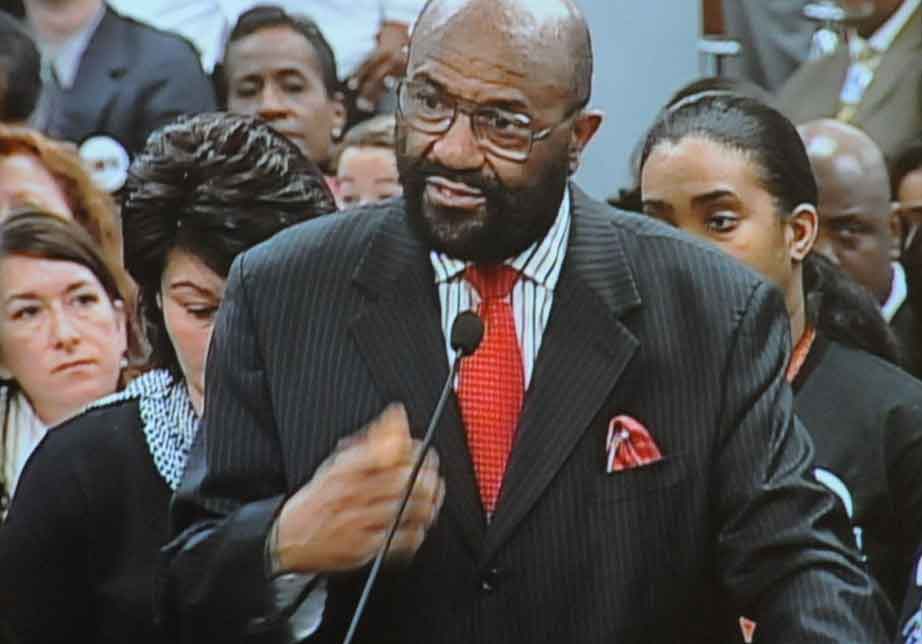 After trying to deal with the Board of Education quietly in his ward, 28th Ward Alderman Ed Smith (above) became angry at what he called the "disrespect" shown by Ron Huberman and CPS officials to the people of his ward. Three schools in Smith's ward were slated to be closed or subjected to "turnaround" by Ron Huberman's first listing. By February 24, 2010, when Smith spoke to the Chicago Board of Education (above), Tilton and Marconi elementary schools were off the Hit List, but Marshall High School was still facing turnaround. Substance photo by George N. Schmidt.Following 18 public hearings between January 28 and February 10, the list was reduced to ten. Following a City Council hearing on February 22, the list was reduced to eight. The vote on the remaining eight schools was unanimous and took place at the end of a lengthy meeting held on February 24, 2010 at CPS headquarters at 125 S. Clark St. in Chicago. As usual, the seven members of the Chicago Board of Education did not even vote individually on each school they were destroying.
After trying to deal with the Board of Education quietly in his ward, 28th Ward Alderman Ed Smith (above) became angry at what he called the "disrespect" shown by Ron Huberman and CPS officials to the people of his ward. Three schools in Smith's ward were slated to be closed or subjected to "turnaround" by Ron Huberman's first listing. By February 24, 2010, when Smith spoke to the Chicago Board of Education (above), Tilton and Marconi elementary schools were off the Hit List, but Marshall High School was still facing turnaround. Substance photo by George N. Schmidt.Following 18 public hearings between January 28 and February 10, the list was reduced to ten. Following a City Council hearing on February 22, the list was reduced to eight. The vote on the remaining eight schools was unanimous and took place at the end of a lengthy meeting held on February 24, 2010 at CPS headquarters at 125 S. Clark St. in Chicago. As usual, the seven members of the Chicago Board of Education did not even vote individually on each school they were destroying.
Using a procedure which they have used for years, the newly installed Board President allowed them to vote once, then "apply the last favorable voice vote" to a long list of numbers (each designating one recommendation by the Chief Executive Officer), thereby moving the public meeting ahead very quickly but leaving most of those listening in the dark. "Did they vote on the turnarounds?" was the question when, after several minutes of hearing the secretary read lists like "EX 1 to EX 13...", dozens of people who had stayed at the Board all day saw the meeting adjourned and the seven Board members and CEO Ron Huberman beat a hasty retreat out the back door of the chamber, behind a heavy screen of security.
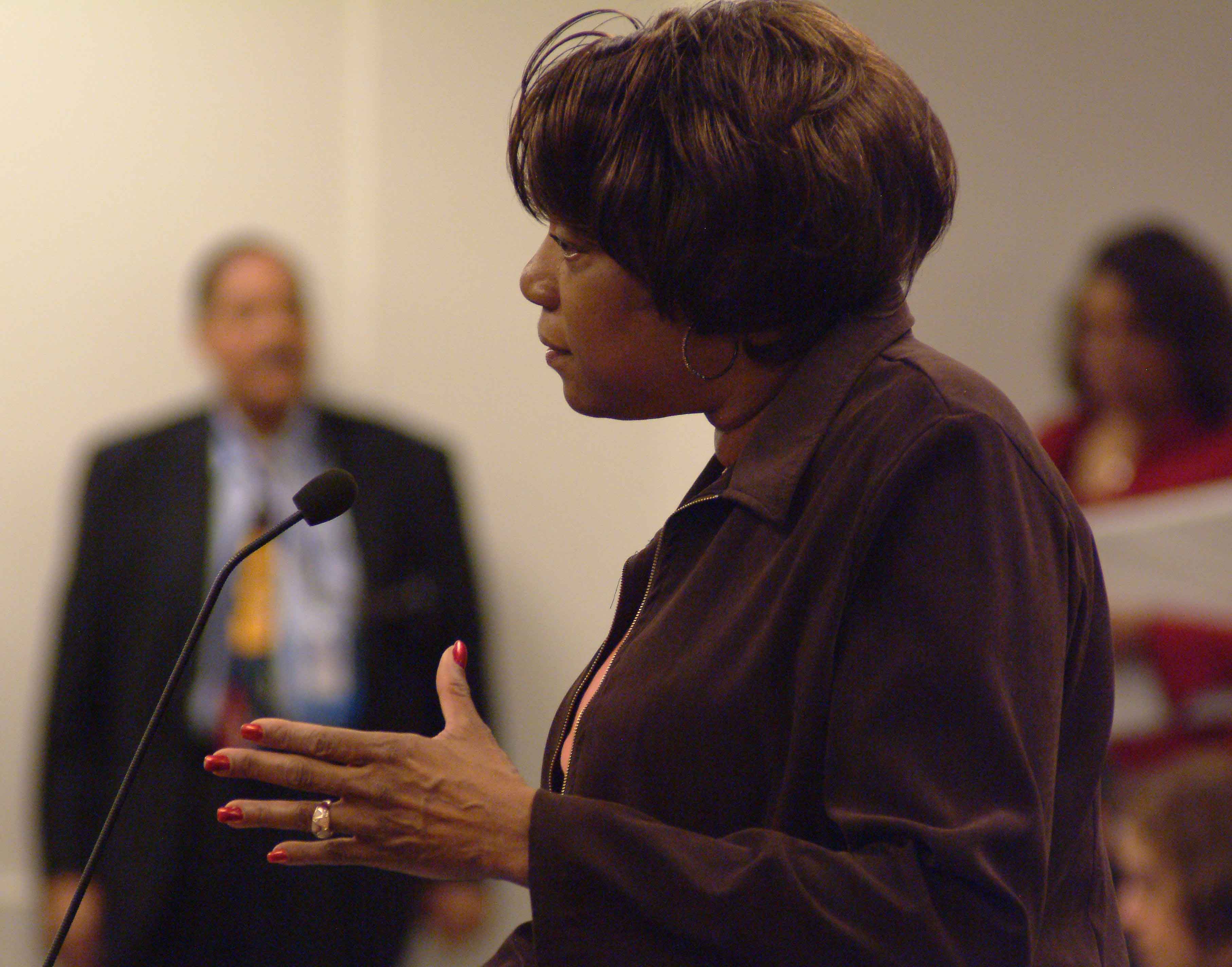 After five weeks of fighting for a moratorium on public school closings, phase outs, consolidations, and turnarounds, Third Ward Alderman Pat Dowell (above) asked the Chicago Board of Education to defer voting on the proposals before it from Ron Huberman. Although Huberman withdrew a complex proposal to close Mollison Elementary School (which is located in the Third Ward), he submitted his earlier proposals to subject Phillips High School to "turnaround" and to close and consolidate McCorkle Elementary School. Both Phillips and McCorkle are in the Third Ward, which had the largest number of changes proposed this school year. Substance photo by Garth Liebhaber."This is a sad day for public education," said Alderman Pat Dowell, who sponsored a one-year moratorium resolution in the City Council. "I don't think neighborhood schools should be punished." Although one school in Pat Dowell's third ward (Mollison Elementary) had been removed from what critics called the 'Hit List', two others, McCorkle Elementary School and Phillips High School were still on the agenda when the vote came in late afternoon.
After five weeks of fighting for a moratorium on public school closings, phase outs, consolidations, and turnarounds, Third Ward Alderman Pat Dowell (above) asked the Chicago Board of Education to defer voting on the proposals before it from Ron Huberman. Although Huberman withdrew a complex proposal to close Mollison Elementary School (which is located in the Third Ward), he submitted his earlier proposals to subject Phillips High School to "turnaround" and to close and consolidate McCorkle Elementary School. Both Phillips and McCorkle are in the Third Ward, which had the largest number of changes proposed this school year. Substance photo by Garth Liebhaber."This is a sad day for public education," said Alderman Pat Dowell, who sponsored a one-year moratorium resolution in the City Council. "I don't think neighborhood schools should be punished." Although one school in Pat Dowell's third ward (Mollison Elementary) had been removed from what critics called the 'Hit List', two others, McCorkle Elementary School and Phillips High School were still on the agenda when the vote came in late afternoon.
Bradwell, Curtis, and Deneen Elementary schools and Phillips and Marshall High Schools will fire their entire staff under "turnaround." Although the original agenda called for all of the schools facing "turnaround" except Marshall High School to go to the controversial "Academy for Urban School Leadership" (AUSL), the Board deferred consideration of the Board Reports that would have given the schools to AUSL. All the turnaround schools except Marshall were supposed to be outsourced to the AUSL management company to run the schools.
CPS communications officials confirmed at the time of the vote that some of the AUSL turnarounds had been postponed but had no explanation. Not all of the schools are facing "turnaround." Schneider Elementary School will be phased out, and McCorkle Elementary School will be consolidated into Beethoven school. The Las Casas Occupational High School will be closed and the students sent to private operators.
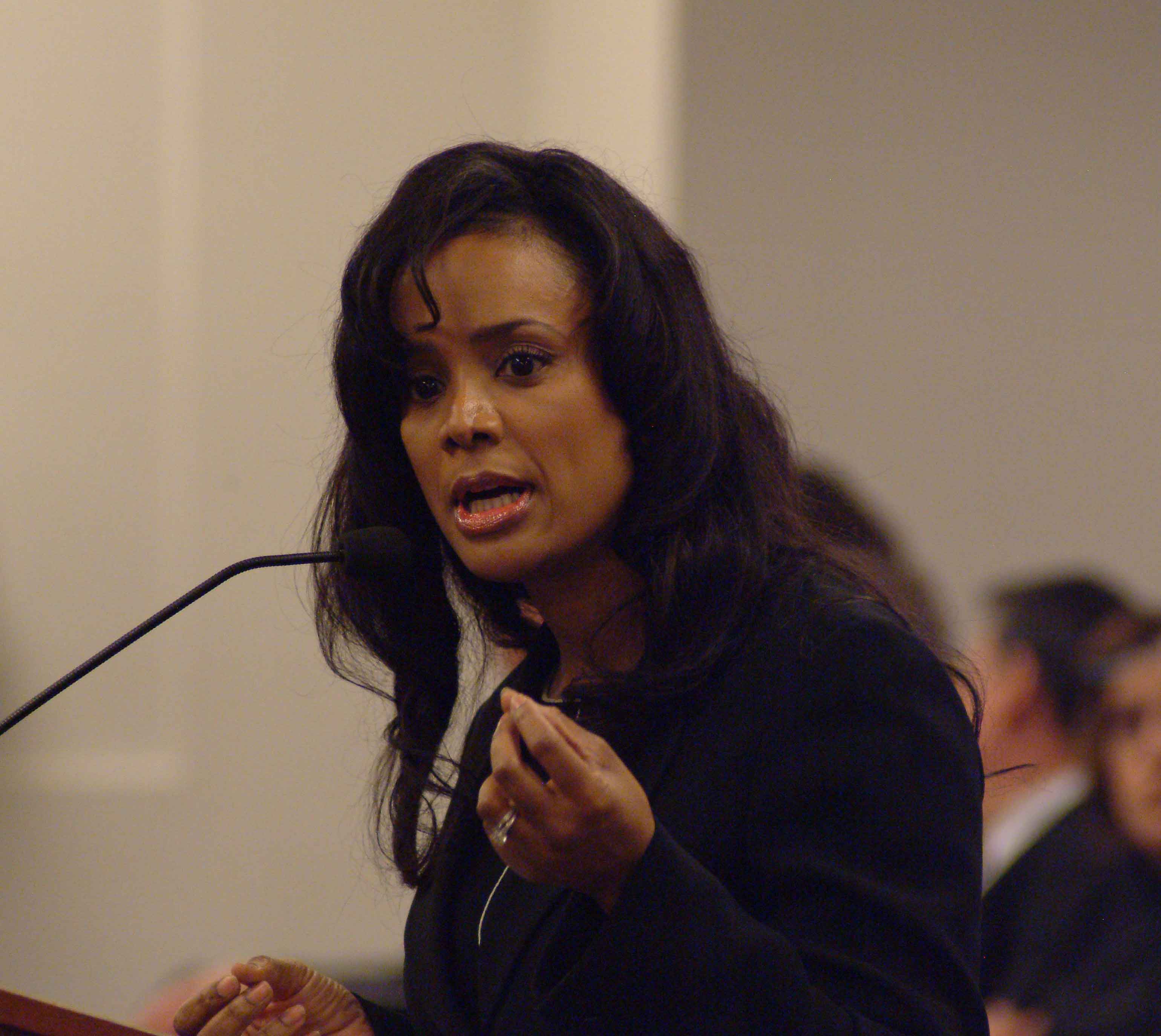 Seventh Ward Alderman Sandi Jackson (above) asked the Chicago Board of Education not to subject Bradwell Elementary School, in her ward, to "turnaround." Alderman Jackson had earlier joined teachers, parents, students and the principal of Bradwell in presenting a case that the school should not be subjected to "turnaround" based on the Board's own criteria. Nevertheless, the Board of Education ignored Alderman Jackson's plea and voted unanimously and without debate to approve Ron Huberman's "turnaround" proposal. Substance photo by George N. Schmidt.Last year, not one Chicago alderman addressed the Board about school closings at the meeting that voted on their fate. This year (Seventh Ward) Alderman Sandi Jackson, (28th Ward) Alderman Ed Smith and (Third Ward) Alderman Pat Dowell spoke out against a process they say does not include the community and is seriously flawed. Alderman George Cardenas also spoke at the Board meeting, but not about the closings and turnarounds.
Seventh Ward Alderman Sandi Jackson (above) asked the Chicago Board of Education not to subject Bradwell Elementary School, in her ward, to "turnaround." Alderman Jackson had earlier joined teachers, parents, students and the principal of Bradwell in presenting a case that the school should not be subjected to "turnaround" based on the Board's own criteria. Nevertheless, the Board of Education ignored Alderman Jackson's plea and voted unanimously and without debate to approve Ron Huberman's "turnaround" proposal. Substance photo by George N. Schmidt.Last year, not one Chicago alderman addressed the Board about school closings at the meeting that voted on their fate. This year (Seventh Ward) Alderman Sandi Jackson, (28th Ward) Alderman Ed Smith and (Third Ward) Alderman Pat Dowell spoke out against a process they say does not include the community and is seriously flawed. Alderman George Cardenas also spoke at the Board meeting, but not about the closings and turnarounds.
"I'm here because I'm concerned about the posterity of our children," Alderman Smith told the Board. "Marconi has some problems, but we simply can't jettison these kids. It seems we have a problem to get together. Just because these people don't have PhDs and MBAs doesn't mean we don't need to bring in these parents. We got to work together to give the children what they need."
Last year, some of the schools that protested strongly were removed from the list, thus avoiding an ugly confrontation on the day the Board was to vote on closing schools.
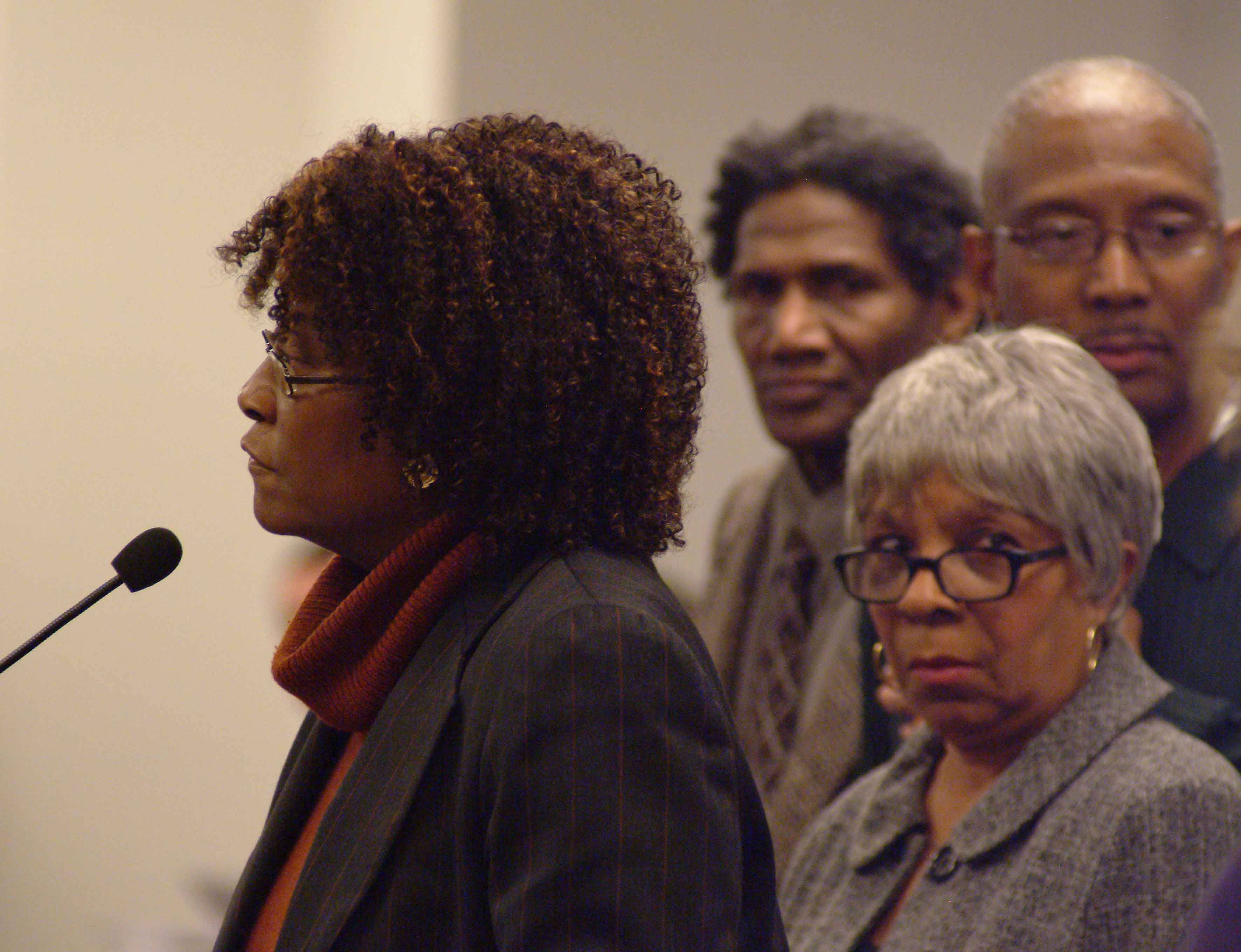 Martha Idewu of Phillips High School spoke against the plan to subject Phillips to "turnaround." Observers noted that a major community meeting opposing the Phillips proposal had taken place on February 18 in the community, but both CPS and the city's corporate media had ignored the community's feelings. Among other things that came out at the Phillips community meeting was that the Academy for Urban School Leadership (AUSL) has only one Black person on its Board of Directors and has been replacing largely African American teaching staffs with faculties consisting mainly of young white women, as happened at Fenger High School a few weeks before the fatal beating of Fenger junior Derrion Albert on September 24, 2009. The AUSL record, critics have said, is simply one of getting rid of black teachers and replacing them with white teachers, while also getting rid of the worst students and making sure the numbers go "up" for at least a year or two following "turnaround." Substance photo by Garth Liebhaber. In January 2009, Huberman announced a list of 22 schools facing various kinds of termination. That list had been prepared by Huberman's predecessor, Arne Duncan, who had been selected by President Barack Obama to become U.S. Secretary of Education. After hearings, Huberman reduced the number of schools on the 2009 Hit List to 16. Schools that protested loudly and effectively last year include Holmes Elementary School, Peabody Elementary School, and Las Casas Occuptational High School. Holmes and Peabody were still off the 2010 list, but Las Casas was back on this list, this time with a different reason for being closed.
Martha Idewu of Phillips High School spoke against the plan to subject Phillips to "turnaround." Observers noted that a major community meeting opposing the Phillips proposal had taken place on February 18 in the community, but both CPS and the city's corporate media had ignored the community's feelings. Among other things that came out at the Phillips community meeting was that the Academy for Urban School Leadership (AUSL) has only one Black person on its Board of Directors and has been replacing largely African American teaching staffs with faculties consisting mainly of young white women, as happened at Fenger High School a few weeks before the fatal beating of Fenger junior Derrion Albert on September 24, 2009. The AUSL record, critics have said, is simply one of getting rid of black teachers and replacing them with white teachers, while also getting rid of the worst students and making sure the numbers go "up" for at least a year or two following "turnaround." Substance photo by Garth Liebhaber. In January 2009, Huberman announced a list of 22 schools facing various kinds of termination. That list had been prepared by Huberman's predecessor, Arne Duncan, who had been selected by President Barack Obama to become U.S. Secretary of Education. After hearings, Huberman reduced the number of schools on the 2009 Hit List to 16. Schools that protested loudly and effectively last year include Holmes Elementary School, Peabody Elementary School, and Las Casas Occuptational High School. Holmes and Peabody were still off the 2010 list, but Las Casas was back on this list, this time with a different reason for being closed.
Some of the schools that protested loudly this year, against the 2010 list, were removed from the list, too. These included Guggenheim Elementary on the South Side (who filled a gymnasium with an outraged community that dared the Board to break up their family).
Prescott Elementary School (on the North Side), which mobilized over 700 people to support their school at two public hearings, was removed from the Hit List at the last minute. Prescott had turned out more than 200 people for a hearing at CPS headquarters, then turned out more than 500 people for a Saturday morning hearing at the school itself. Prescott had fewer than 250 children attending it at the time CPS slated the school for closing.
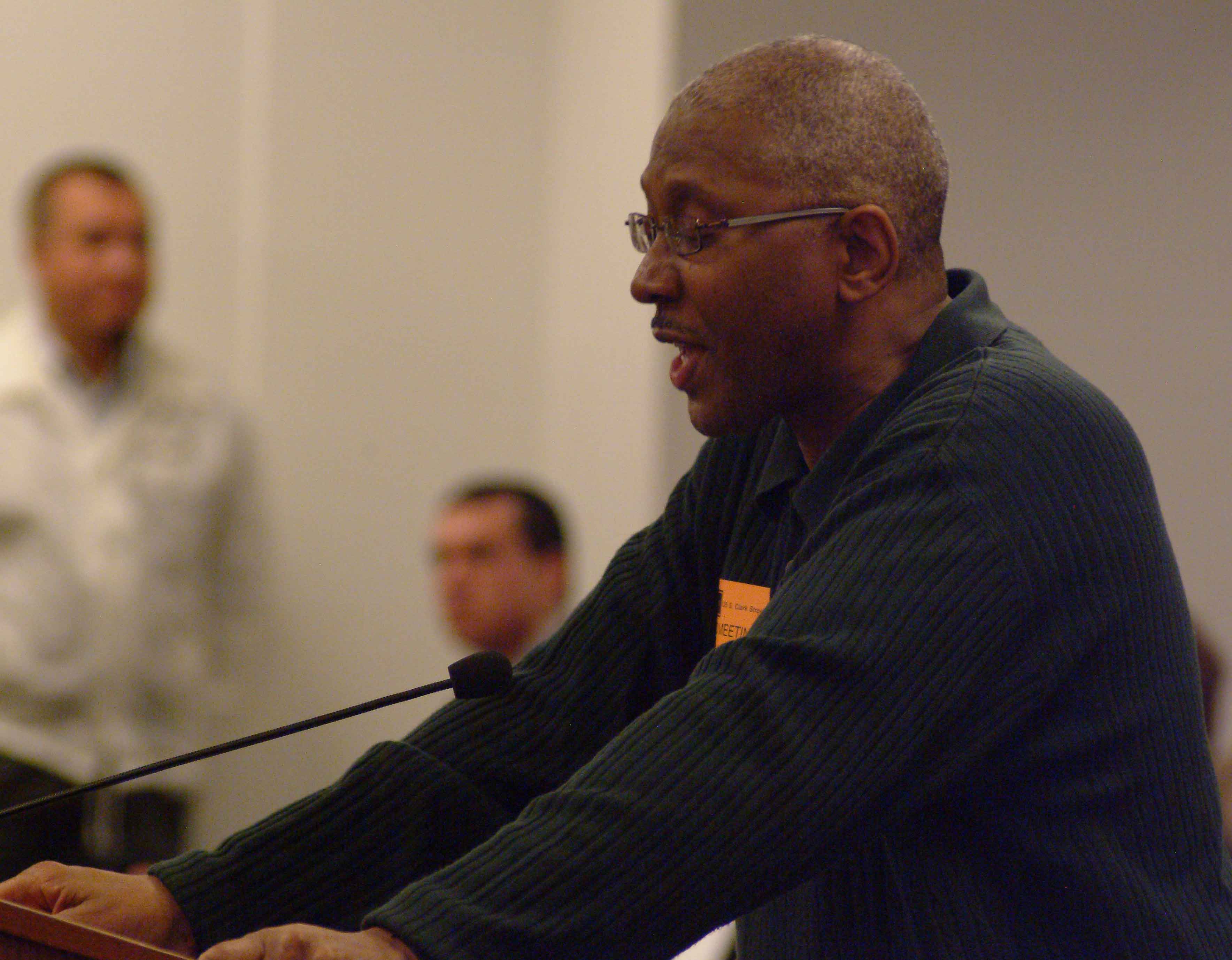 Retired Chicago teacher Hubert Jackson (above) spoke in opposition to the "turnaround" of Phillips High School on his own behalf and on behalf of the Phillips High School Alumni Association. Phillips High School, the oldest all-black high school in Chicago, has a "Hall of Fame" (of which Jackson is a member) attesting to its ability to educate more than 100 years of Chicago's black leaders. Hubert Jackson told the Board of Education that the use of so-called "standardized" tests and the Board's new "Performance Management System" doesn't measure much that is relevant about a school like Phillips, which takes all students from one of the nation's poorest black ghettos. Jackson contrasted the success of the Phillips High School staff with the relative failure of the staff of Gwendolyn Brooks High School, from which Jackson retired. Jackson noted that even as Brooks was allowed to recruit its students, the political corruption of the Brooks administration meant that year after year, the students who attended Brooks were getting a worse education than those at Phillips. Substance photo by George N. Schmidt.Other schools removed from the list were not allowed public hearings in the community. These included Mollison Elementary, Paderewski Elementary, and Marconi Elementary.
Retired Chicago teacher Hubert Jackson (above) spoke in opposition to the "turnaround" of Phillips High School on his own behalf and on behalf of the Phillips High School Alumni Association. Phillips High School, the oldest all-black high school in Chicago, has a "Hall of Fame" (of which Jackson is a member) attesting to its ability to educate more than 100 years of Chicago's black leaders. Hubert Jackson told the Board of Education that the use of so-called "standardized" tests and the Board's new "Performance Management System" doesn't measure much that is relevant about a school like Phillips, which takes all students from one of the nation's poorest black ghettos. Jackson contrasted the success of the Phillips High School staff with the relative failure of the staff of Gwendolyn Brooks High School, from which Jackson retired. Jackson noted that even as Brooks was allowed to recruit its students, the political corruption of the Brooks administration meant that year after year, the students who attended Brooks were getting a worse education than those at Phillips. Substance photo by George N. Schmidt.Other schools removed from the list were not allowed public hearings in the community. These included Mollison Elementary, Paderewski Elementary, and Marconi Elementary.
Many observers felt that Prescott had been included on the list because the other 13 schools were all-black and all-poor. In a city obsessed with trying to present an image of diversity (but having almost an apartheid level of racial segregation), Prescott "drew the short straw." Once Prescott was removed from the list, all of the schools facing "turnaround" and the other terminations were black, with the majority of those teachers and other staff facing the end of their careers being black as well.
For the first time this year, CPS didn't have to explain anything about the racial composition of the schools facing termination. Under a federal court ruling last winter, Chicago is no longer required to try to "desegregate" its schools. During the 30 years Chicago was under a federal "desegregation" consent decree, the city's leaders maintained the maximum feasible segregation, resulting in a school system that had more than 300 all-black (i.e. schools where the student population was between 90 percent and 100 percent black) public schools by the time the 2010 Hit List was announced. Because Chicago's corporate news media ignored the 18 hearings, there was no visual record of the racial impact of the Huberman list.
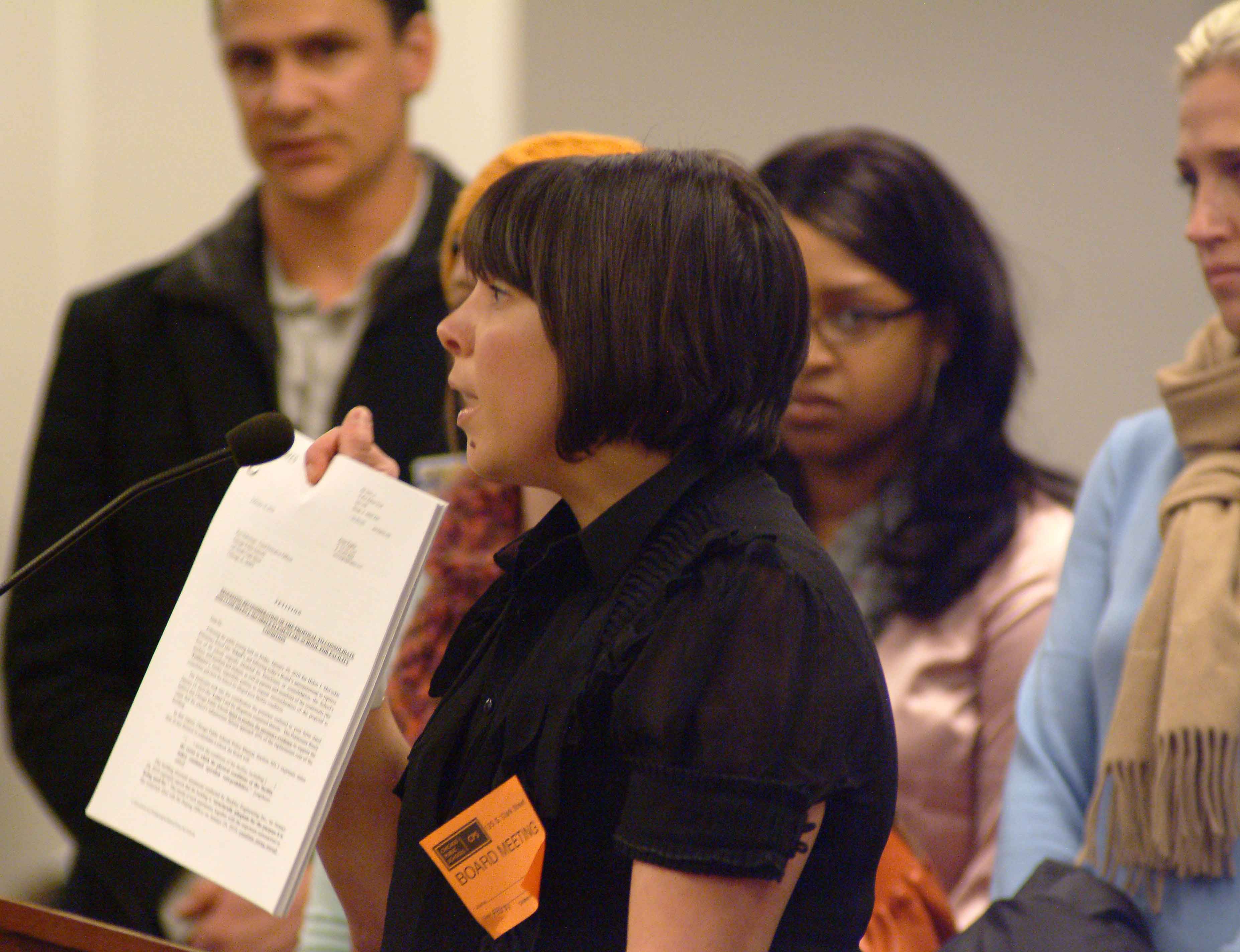 Anna Paglia, an attorney who has been working with McCorkle Elementary School to help prevent the closing of the school, refuted the Board of Education's claims that the expense of repairing McCorkle would make the cost too prohibitive for CPS. Ron Huberman responded by reiterating the numbers that had been presented by Paglia following an independent engineering study of McCorkle. Huberman has also been ignoring the massive cost of what observers are calling "Mayor Daley's Vanity Projects" under the nearly $1 billion construction and rehabilitation bond issue approved by the Chicago Board of Education in 2009. While schools like McCorkle are destroyed by CPS because Huberman claims the school system can't afford a few million for repairs, Daley's pet projects (especially charter schools and military schools) receive between $10 million and $30 million for rehabilitation. One example observers have cited is the cost of planting tress and other shrubbery around schools that have been converted to charters (like Austin High School) or schools going through "turnaround" (like Fenger High School). The cost of landscaping at Austin and Fenger exceeds what CPS says it would cost to repair the McCorkle building. Substance photo by Garth Liebhaber. Night after night, during the hearings, Substance documented the dignified refutations that the schools ŌĆö from principals to children ŌĆö brought to the hearing officers ŌĆö and night after night, Chicago's news media ignored each and every hearing. The only visual record of the hearings has been published at Substance, since the Board of Education ran the visual on overhead monitors during the hearings themselves, but refused to make a taped video version of each hearing. CPS officials told Substance that the audio and transcripts of the hearings were available, and those have been requested under the Freedom of Information Act (FOIA).
Anna Paglia, an attorney who has been working with McCorkle Elementary School to help prevent the closing of the school, refuted the Board of Education's claims that the expense of repairing McCorkle would make the cost too prohibitive for CPS. Ron Huberman responded by reiterating the numbers that had been presented by Paglia following an independent engineering study of McCorkle. Huberman has also been ignoring the massive cost of what observers are calling "Mayor Daley's Vanity Projects" under the nearly $1 billion construction and rehabilitation bond issue approved by the Chicago Board of Education in 2009. While schools like McCorkle are destroyed by CPS because Huberman claims the school system can't afford a few million for repairs, Daley's pet projects (especially charter schools and military schools) receive between $10 million and $30 million for rehabilitation. One example observers have cited is the cost of planting tress and other shrubbery around schools that have been converted to charters (like Austin High School) or schools going through "turnaround" (like Fenger High School). The cost of landscaping at Austin and Fenger exceeds what CPS says it would cost to repair the McCorkle building. Substance photo by Garth Liebhaber. Night after night, during the hearings, Substance documented the dignified refutations that the schools ŌĆö from principals to children ŌĆö brought to the hearing officers ŌĆö and night after night, Chicago's news media ignored each and every hearing. The only visual record of the hearings has been published at Substance, since the Board of Education ran the visual on overhead monitors during the hearings themselves, but refused to make a taped video version of each hearing. CPS officials told Substance that the audio and transcripts of the hearings were available, and those have been requested under the Freedom of Information Act (FOIA).
Marconi Elementary was on of the last two schools removed from the list after Alderman Ed Smith blasted Huberman at a City Council Education Committee public hearing on Monday, February 22. At that time, Smith told the Council that he was "outraged" at being called the night before that they would close a school in his ward.
According to the Board of Education, the hearing officer recommended to close Marconi but Huberman is suspending the decision until officials work with the community on alternative options.
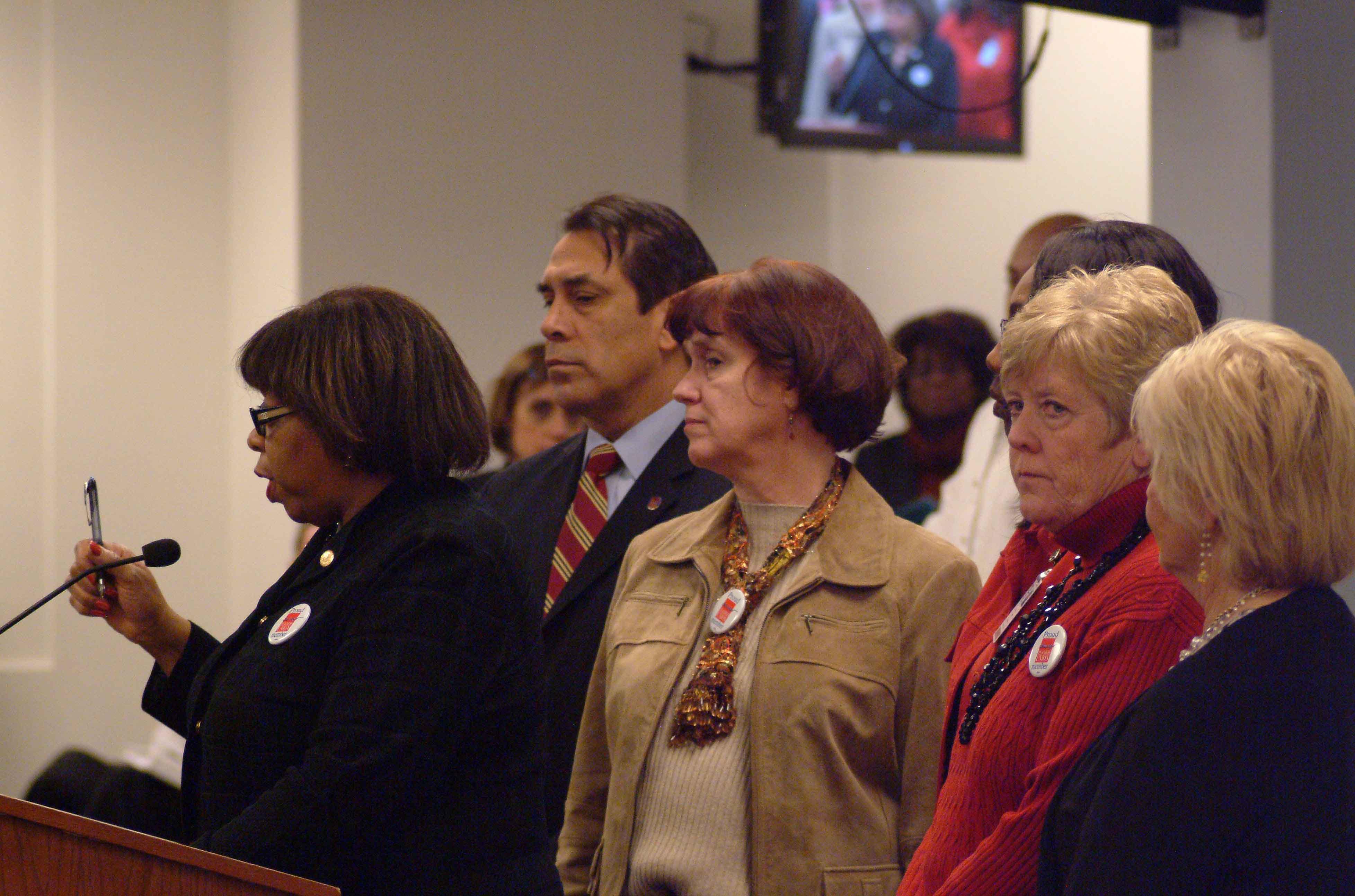 Chicago Teachers Union President Marilyn Stewart joined the chorus of teachers, political and community leaders calling for a moratorium on all closings, phase outs, consolidations, and "turnarounds." Stewart had spent the previous week speaking out against the turnarounds and other radical changes, holding press conference and picket lines at several of the schools still on the Hit List. She began February 24, the day of the Board meeting, on a picket line at Phillips High School, then led a picket line outside CPS headquarters at 125 S. Clark St. Despite the protests of almost all of the union and political leaders in Chicago's African American community, the seven members of the Board of Education voted unanimously and without debate to do "turnaround" to Curtis, Bradwell, and Deneen elementary schools and to Phillips and Marshall high schools. The Board also voted to consolidate McCorkle Elementary School, phase out Schneider Elementary School, and close Las Casas Occupational High School (privatizing all the services that had been done there). Substance photo by Garth Liebhaber. The Chicago Teachers Union faxed schools to consider joining an "informational picket" outside the Board headquarters on Clark Street before the Board meeting ŌĆö despite warning teachers last year that taking off work to go to the Board to protest could be seen in violation of their contract. Teachers led by CTU President Marilyn Stewart picketed the Board meeting before going upstairs for the meeting itself. Earlier, Stewart and others had staged an informational picket outside Phillips High School, as 244 E. Pershing Road. Phillips was one of the schools to be subjected to "turnaround." Although not many teachers came to picket, CTU President Marilyn Stewart held a press conference and addressed the Board about the school closings.
Chicago Teachers Union President Marilyn Stewart joined the chorus of teachers, political and community leaders calling for a moratorium on all closings, phase outs, consolidations, and "turnarounds." Stewart had spent the previous week speaking out against the turnarounds and other radical changes, holding press conference and picket lines at several of the schools still on the Hit List. She began February 24, the day of the Board meeting, on a picket line at Phillips High School, then led a picket line outside CPS headquarters at 125 S. Clark St. Despite the protests of almost all of the union and political leaders in Chicago's African American community, the seven members of the Board of Education voted unanimously and without debate to do "turnaround" to Curtis, Bradwell, and Deneen elementary schools and to Phillips and Marshall high schools. The Board also voted to consolidate McCorkle Elementary School, phase out Schneider Elementary School, and close Las Casas Occupational High School (privatizing all the services that had been done there). Substance photo by Garth Liebhaber. The Chicago Teachers Union faxed schools to consider joining an "informational picket" outside the Board headquarters on Clark Street before the Board meeting ŌĆö despite warning teachers last year that taking off work to go to the Board to protest could be seen in violation of their contract. Teachers led by CTU President Marilyn Stewart picketed the Board meeting before going upstairs for the meeting itself. Earlier, Stewart and others had staged an informational picket outside Phillips High School, as 244 E. Pershing Road. Phillips was one of the schools to be subjected to "turnaround." Although not many teachers came to picket, CTU President Marilyn Stewart held a press conference and addressed the Board about the school closings.
"You should honor the moratorium on school closings," Stewart told the Board. "We're here to fight for public education."
Immediately following Stewart was Karen Lewis, who teaches at King High School. Lewis is a presidential candidate on the CORE slate who will be challenging Stewart in the May union elections. She focused her anger on the turnaround policy and how it is not working. She noted that stability is being sacrificed as a result.
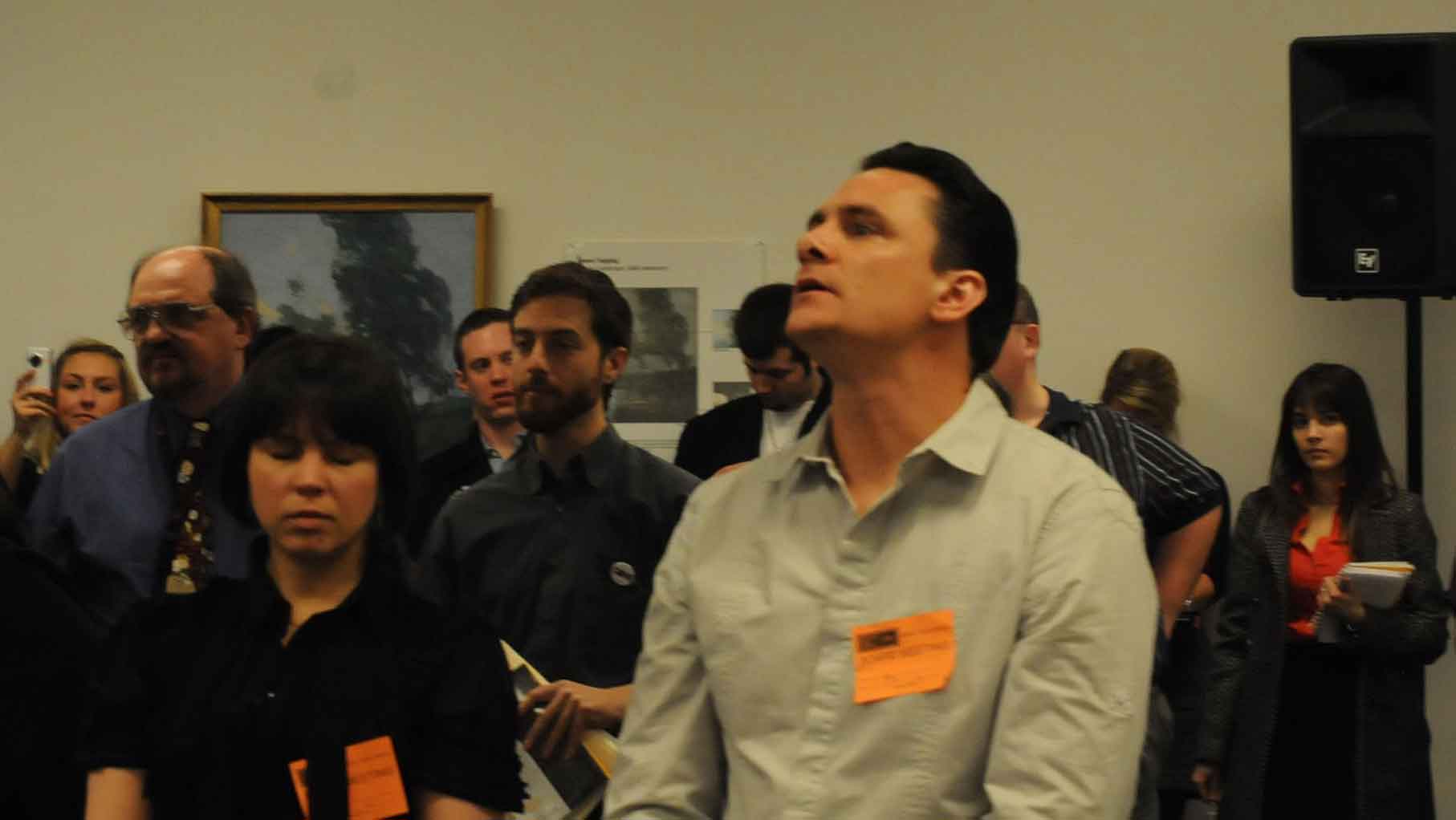 As CTU President Marilyn Stewart began to speak, she asked all the union members in the meeting to stand. Most of the people present were standing as Stewart began speaking, the only large groups not standing being the CPS administrators who are routinely seated in the center section of the chambers in seats marked "reserved." Substance photo by George N. Schmidt."The turnaround policy is just a layoff policy," Lewis said. She emphasized that the replacement for teachers who are fired from turnaround schools are not committed to the public schools. "Of the 31 graduates from AUSL [five years ago]," Lewis told the Board, "there are only 5 who are still teaching in their original schools after three years. Please do not turnaround our schools."
As CTU President Marilyn Stewart began to speak, she asked all the union members in the meeting to stand. Most of the people present were standing as Stewart began speaking, the only large groups not standing being the CPS administrators who are routinely seated in the center section of the chambers in seats marked "reserved." Substance photo by George N. Schmidt."The turnaround policy is just a layoff policy," Lewis said. She emphasized that the replacement for teachers who are fired from turnaround schools are not committed to the public schools. "Of the 31 graduates from AUSL [five years ago]," Lewis told the Board, "there are only 5 who are still teaching in their original schools after three years. Please do not turnaround our schools."
CORE made the most impressive showing as a group of organized teachers who pointed out the problems with Renaissance 2010 and its school closings policy. CORE and UPC were the only two teacher caucuses who attended the Board meeting on Wednesday. One member of Deborah Lynch's PACT caucus was at the meeting. Substance did not observe anyone from the other three groups challenging Stewart for CTU leadership.
CORE founder Jackson Potter said the Board is doing everything against good school policy, such as eliminating local school councils. Once again, Potter shared a book with the members of the board, noting that he is a teacher and is always suggesting books to be read.
"Can you knock out Ren 2010 instead of us knocking you out, and you know we're a non-violent people," Jackson said with a smile.
CORE's Joe Linehan, who teaches at the overcrowded Eberharty Elementary School on the South Side, told the Board it certainly doesn't feel like a Renaissance. "Only dropouts and violence are increasing," Linehan said. "You privatize a lot in this city, but these kids aren't parking meters."
Carol Caref, who teaches at Chicago Vocational High School and is an original member of CORE, told the Board that they should use her time to give to a Julian student who had earlier received a Democracy award from the Board, but was not allowed to speak, which appeared to be unprecedented. The student who did speak sat next to the Board members and blamed the parents for the problems in schools in his speech.
After arguing with Caref, Board member, Board Vice President Clare Munana, who was chairing the meeting at that point, finally relented and allowed the Julian student, Chantelle Steve, to speak. But Steve was too emotional and started crying as she said this whole school closing business is horrible and should be stopped. She was not able to deliver the speech she had prepared to give.
Liz Brown, a teacher at Kelvyn Park High School and CORE media specialist, made the school closings connection to the Race to the Top, in which President Barack Obama and Education Secretary Arne Duncan are using the Chicago model to close or turnaround thousands of urban schools across the nation. Michael Brunson, a displaced teacher who is currently the recording secretary candidate on the CORE slate, said all this data performance criteria is demoralizing to the teachers.
"How do you think the teachers feel when you are bashing them all the time," Brunson said. "It looks like you're not only throwing the baby out with the bath water, you're throwing out the tub."
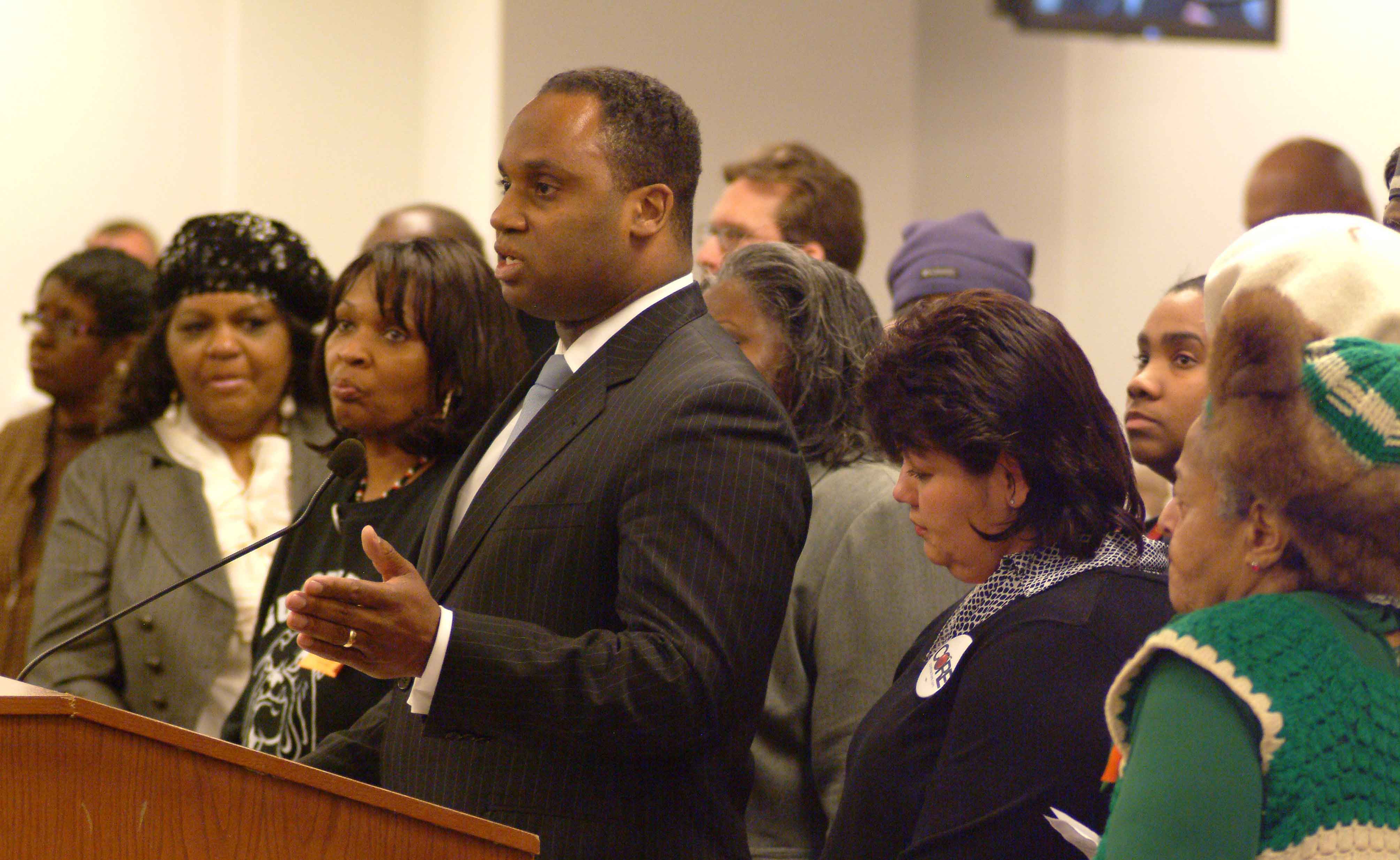 Jonathan Jackson of Operation PUSH was joined by dozens of colleagues from PUSH, CORE, and other groups when he took the floor to point out to the Board of Education that the problems at the schools being proposed for "turnaround" were not the fault of the teachers, principals and others in the five schools on the Hit List, but the economic crisis which has been hitting hardest in Chicago's inner city. The Board of Education ignored Jackson's analysis and voted unanimously and without debate to approve the recommendations of the CEO regarding the remaining eight schools on the 2010 Hit List. Substance photo by Garth Liebhaber.One of the community leaders who challenged the Board's turnaround and closing activities was Jonathan Jackson, national outreach coordinator for Operation PUSH, which was founded by his father, Rev. Jesse Jackson Sr. Jonathan Jackson began working with schools against the closings at the time of the 2009 Hit List and helped get Holme Elementary School removed from the 2009 list. He told the Board that the problems facing the children and families that attend the schools that are being called "failures" were the result of failures of the economy and social systems surrounding the schools. All of the schools slated for "turnaround" are situated in the most segregated and impoverished parts of Chicago's vast African American ghetto, which stretches for more than 20 contiguous miles and includes more than 300 completely segregated (90 percent to 100 percent) all-black schools. The segregation policies of the Duncan and Huberman administration's at CPS, following the segregation policies of Chicago Mayor Richard M. Daley, have been left out of the school "failure" debate.
Jonathan Jackson of Operation PUSH was joined by dozens of colleagues from PUSH, CORE, and other groups when he took the floor to point out to the Board of Education that the problems at the schools being proposed for "turnaround" were not the fault of the teachers, principals and others in the five schools on the Hit List, but the economic crisis which has been hitting hardest in Chicago's inner city. The Board of Education ignored Jackson's analysis and voted unanimously and without debate to approve the recommendations of the CEO regarding the remaining eight schools on the 2010 Hit List. Substance photo by Garth Liebhaber.One of the community leaders who challenged the Board's turnaround and closing activities was Jonathan Jackson, national outreach coordinator for Operation PUSH, which was founded by his father, Rev. Jesse Jackson Sr. Jonathan Jackson began working with schools against the closings at the time of the 2009 Hit List and helped get Holme Elementary School removed from the 2009 list. He told the Board that the problems facing the children and families that attend the schools that are being called "failures" were the result of failures of the economy and social systems surrounding the schools. All of the schools slated for "turnaround" are situated in the most segregated and impoverished parts of Chicago's vast African American ghetto, which stretches for more than 20 contiguous miles and includes more than 300 completely segregated (90 percent to 100 percent) all-black schools. The segregation policies of the Duncan and Huberman administration's at CPS, following the segregation policies of Chicago Mayor Richard M. Daley, have been left out of the school "failure" debate.
One reporter with CBS TV noted that there weren't many teachers from the closing schools who testified at the Board meeting. Bradwell and Deneen parents and students were forced to sit in the holding room because there was not enough room in the Board chambers. The Board reserved several rows of seats for their employees, thus locking out a significant number of stake holders whose very careers were being decided on in that room.
None of the television reporters who filled the Board's meeting room on February 24 had bothered to attend any of the 18 hearings which had been scheduled and held between January 28 and February 10. Chicago media currently have only two full time reporters covering the city's vast public school system, and both of those write for print publications. All of the TV reporters are little informed about the vast city and its more than 650 public schools. On many occasions, TV news doesn't even send a reporter to cover a school news story, but simply sends a camera crew (that can't ask questions or report) to take pictures, and the content of the "news" is inserted later at the studio.
An observer noted that the Board meetings are held during the day, when most parents and teachers are forced to be at work. There were more than a dozen TV, radio, and print reporters at the February 24 meeting. Only one reporter (Rosalind Rossi of the Chicago Sun-Times) in addition to Substance's reporting team had attended any of the hearings at Clark St. during the lengthy process that led up to February 24.
"The missed a lot by not listening to the people when the people were able to attend those hearings," said Substance editor George Schmidt. "Had they bothered to notice that every night for two weeks there was a massive amount of real news taking place during those hearings, they might not have showed so much ignorance when they finally got to the Board on February 24. But that's how corporate media ŌĆö and most corporate reporters ŌĆö are operating in 2010 and why guys like Ron Huberman can get away with so many lies and evasions."
A couple of high school teachers from Phillips and Marshall who are all slated to be fired did speak out to the Board. Michael Johnson, a teacher at Marshall High School, appealed to Huberman's police background to understand the harmful effects of turnaround.
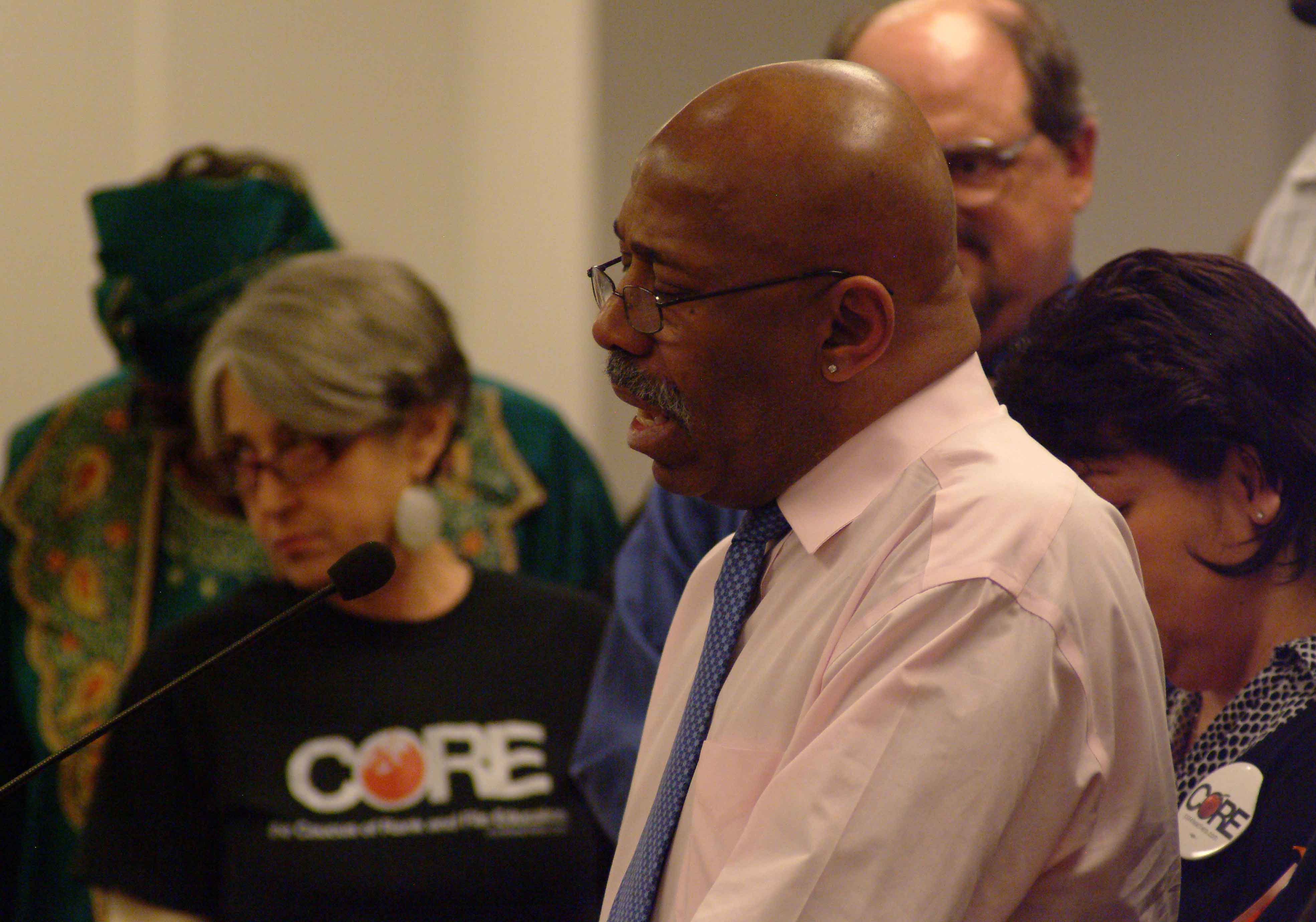 One of those speaking against the "turnaround" of Marshall High School was Marshall counselor Michael Johnson (above), who told the Board he was also a Marshall alumnus. Johnson compared what the Board was doing with "turnaround" to firing all the police officers in a district with high crime and then replacing them with rookies. A few hours later, the Board ignored him and the hundreds who had protested against the "turnaround" of Marshall and voted to do the turnaround, placing it in the hands of the Board's "Chief Turnaround Officer," deposed Jones High School principal Donald Fraynd. Earlier, Fraynd had told community leaders that he would personally select the replacement teachers for Marshall after the current teachers were fired. Fraynd, a University of Wisconsin graduate with no Chicago teaching experience (he was selected as principal of Jones without any Chicago experience), faced growing criticism during his years as the principal of Jones, but was promoted by Ron Huberman almost as soon as Huberman took office. Substance photo by Garth Liebhaber."I know you know Mr. Huberman where Marshall High School is," Johnson said. "It is in the police district's Area 11, home to one of the highest crime rates in the nation. If we proposed the turnaround model by removing all the police in this area with rookie cops, this would upset everyone."
One of those speaking against the "turnaround" of Marshall High School was Marshall counselor Michael Johnson (above), who told the Board he was also a Marshall alumnus. Johnson compared what the Board was doing with "turnaround" to firing all the police officers in a district with high crime and then replacing them with rookies. A few hours later, the Board ignored him and the hundreds who had protested against the "turnaround" of Marshall and voted to do the turnaround, placing it in the hands of the Board's "Chief Turnaround Officer," deposed Jones High School principal Donald Fraynd. Earlier, Fraynd had told community leaders that he would personally select the replacement teachers for Marshall after the current teachers were fired. Fraynd, a University of Wisconsin graduate with no Chicago teaching experience (he was selected as principal of Jones without any Chicago experience), faced growing criticism during his years as the principal of Jones, but was promoted by Ron Huberman almost as soon as Huberman took office. Substance photo by Garth Liebhaber."I know you know Mr. Huberman where Marshall High School is," Johnson said. "It is in the police district's Area 11, home to one of the highest crime rates in the nation. If we proposed the turnaround model by removing all the police in this area with rookie cops, this would upset everyone."
Donald Baumgartner, a teacher at Marshall, said despite the school's problems, his debate team placed 7th in the city, "but I can't teach them now because I'm somehow a bad teacher. "I'm not asking for a second chance," Baumgartner told the Board members. "I'm asking for a fair chance."
A teacher and an attorney for McCorkle School - which is slated to be closed and consolidated into another school - disputed the Board's assertions that the cost of repairs would amount to 60% of building a new school for roughly $8 million. They said an engineering firm told them the building could be repaired at a cost of $1.2 million to last another 100 years.
"First you said the building needed repairs," said Anna Paglia, a lawyer the McCorkle LSC hired to help save their school. "And then you said it's not safe. Then the children should be out of the building now."
Huberman said they should sit down with his staff to discuss their findings which are at odds with the school's estimates.
After the public testimony ended, the Board members voted in favor of the new Board president Mary Richardson Lowry, an attorney with no educational background, though she told everyone she had many teachers in her family.
"I am by my nature rather exacting," Richardson said in her acceptance speech, whose stern appearance and exacting style appeared to be the opposite of the late Board president Michael Scott who would have joked and played a bit with his audience.
Prior to the Board's recessing into Executive Session, the Board members heard Ron Huberman update his Power Point presentation on the proposed school closings. The original presentation was given at a January 19 media event, and was updated for February 24, eliminating the major emphasis on what Huberman called the "Student Bill of Rights" (which only applied to the closing schools and gave rise to questions as to whether all students didn't deserve a "Bill of Rights") and any mention of the six schools had had previously claimed the Board had to close (Guggenheim, Mollison, Marconi), consolidate, or turnaround (Gillespie). The only questions Board members asked Huberman during his presentation on which schools to close was how he can better communicate his wishes to close or turnaround schools.
Then after closed session, the Board voted to approve a string of letter and number codes that signified the closing of eight Chicago public schools and the elimination of hundreds of Chicago teaching and staff jobs, as children continue to be tossed around on a rocky ship the Mayor still leads into an uncertain future. ’Ż┐
Comments:
By: Spirit of The Dream
The Bull Conner Award goes to Duncan, Daley, Obama
Looking at the photographs from the recent Chicago school board meeting, my question is: Are these school closings only for black people?
And is that what Barack Obama and Arne Duncan claim to be a model for the nation under Race To The Top?
Then...
How are your Chicago mayor, Duncan, and Obama different from the racists who ran people off the Birmingham streets 45 years ago? And don't tell me they're doing this to close an achievement gap or some other nonsense, since it looks like they should be spending all those dollars closing the decent housing, medical care, dental care, and basic nutrition gaps before they go out firing teachers for not being able to do the impossible!
So...
The Bull Conner award for the people who did the most damage to black people this Black History Month has three winners
Richard M. Daley
Arne Duncan
and...
Barack Obama
By: Jay Rehak
Closing schools creates instability
For many of our children, the school is the greatest provider of stability. For some children, it is the only stability in their lives. So let's be clear: destroying a school culture cannot be helpful to children. There exist absolutely zero reputable studies which support firing entire staffs as a means to improving student performance.
All people of good conscience need to band together and continue to oppose those who would continue to instigate instability in our children's lives.
By: Karen Lewis
The New Folks Leave, Too
Jay is absolutely right here. Not only do the turnaround schools fire all the adults the children know, the majority of the new teachers leave within 3-5 years. This is a second slap in the face of the students. How could they not think they did something wrong to cause two sets of adults to leave them? This is a failed policy that Huberman and the Board hold onto like leeches. It has to stop. It's amoral at best and dangerous at worst.
By: Joe Linehan
Anna Paglia
Great article, but one nitpick. I talked to Anna Paglia and she said she was working pro bono for McCorkle. I was very impressed talking to her and quite enjoyed the way that she went on the offensive at the hearings just the way a good lawyer should.
By: Casey
Karen
Karen where were you? Didn't see you at the hearings.
By: Margaret Wilson
retired teacher, parent
I was pleased to see that the list was cut in half from the beginning but there are still way too many schools on the list. It is unfair that the Afro-American community is being targeted and the federal government should take a look at this. The courts also need to put a moratorium on all closings until their effect can be studied and the method of closing/turnarounds can be determined.


By: Sharon Schmidt
Test scores used to judge teachers and schools also needs a moratorium
Good article, Jim. Of course CORE speakers, other teachers and parents, the aldermen, Marilyn Stewart--all had good arguments. And they all should continue to focus on this: standardized test scores should not be used to judge the effectiveness of teachers or the learning of children.